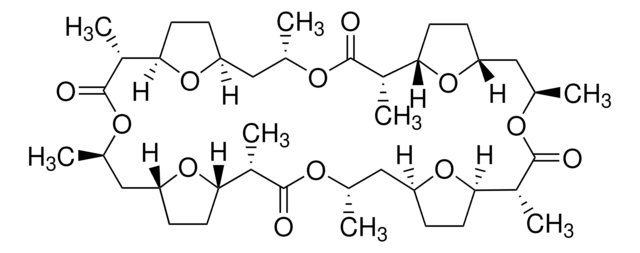516705
o-Phenanthroline
A metal chelating agent that prevents the induction of chromosomal aberrations in streptozotocin-treated cells.
Synonym(s):
o-Phenanthroline, 1,10-Phenanthroline Monohydrate
About This Item
Recommended Products
Quality Level
Assay
≥99% (titration)
form
solid
manufacturer/tradename
Calbiochem®
storage condition
OK to freeze
protect from light
color
white to cream
solubility
DMSO: 100 mg/mL
ethanol: 25 mg/mL
water: 3 mg/mL
shipped in
ambient
storage temp.
10-30°C
InChI
1S/C12H8N2.H2O/c1-3-9-5-6-10-4-2-8-14-12(10)11(9)13-7-1;/h1-8H;1H2
InChI key
PPQJCISYYXZCAE-UHFFFAOYSA-N
General description
Biochem/physiol Actions
Metalloprotease inhibitor
Packaging
Warning
Other Notes
Bolzan, A.D., et al. 2000. Mutat. Res.447, 221.
Wang, Y., et al. 1999. J. Biol. Chem.274, 33043.
Harayama, T., et al. 1999. Jpn. J. Can. Res.90, 942.
Krane, S.M., et al. 1996. J. Biol. Chem.271, 28509.
Uhm, J.H., et al. 1996. Clin. Exp. Metastasis14, 421.
Legal Information
Signal Word
Danger
Hazard Statements
Precautionary Statements
Hazard Classifications
Acute Tox. 3 Oral - Aquatic Acute 1 - Aquatic Chronic 1
Storage Class Code
6.1C - Combustible acute toxic Cat.3 / toxic compounds or compounds which causing chronic effects
WGK
WGK 3
Flash Point(F)
Not applicable
Flash Point(C)
Not applicable
Regulatory Listings
Regulatory Listings are mainly provided for chemical products. Only limited information can be provided here for non-chemical products. No entry means none of the components are listed. It is the user’s obligation to ensure the safe and legal use of the product.
JAN Code
516705-500MG:
516705-MG:
Certificates of Analysis (COA)
Search for Certificates of Analysis (COA) by entering the products Lot/Batch Number. Lot and Batch Numbers can be found on a product’s label following the words ‘Lot’ or ‘Batch’.
Already Own This Product?
Find documentation for the products that you have recently purchased in the Document Library.
Customers Also Viewed
Our team of scientists has experience in all areas of research including Life Science, Material Science, Chemical Synthesis, Chromatography, Analytical and many others.
Contact Technical Service













